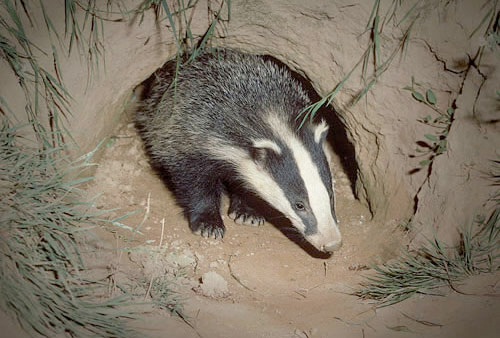
Councillors in the Forest of Dean area will decide on Thursday whether to give financial support to a badger vaccination project as an alternative to the recent culls.
"It is logical to assume, based on experimental evidence, that a significant percentage of wild badgers that are vaccinated will become resistant to infection and or disease," said Councillor Keith Childs.
"In the medium to long term, repeated vaccination is likely to reduce the level of bovine TB infection and disease in the local badger population thus reducing the risk to local cattle from badger – to – cattle transmission."
Recently, the government has been urged by charities to extend its limited Badger Edge Vaccination Funding Scheme as an alternative to culling.
The Chair of Natural England's Scientific Advisory Committee described the culls as an “epic failure”, and the vast majority of independent scientists agree that a cull can make no meaningful contribution to controlling TB in cattle.
"By contrast, badger vaccination using the injectable BCG vaccine is a viable alternative, and DEFRA is promoting public funding for vaccination projects in the 'edge' area bordering the region worst affected by bovine TB in England," the organisation said.
But a vaccination scheme has also been heavily criticised by farming unions. The NFU said no evidence in the world suggested the vaccination of badgers has any affect on the cattle or the disease.
“The council are going to waste £5,000 of taxpayers money. If a vaccination worked I would support it but I don’t think it will at all," Chairman of the National Farmers Union in Gloucestershire, Andrew Guest.
“No-one wants to be killing badgers for no reason. The disease is the enemy, not the badgers. But we wish to see the current level of culls to get on top of the disease.”
But in response to a query, Mr Childs advised that other sources of funding had been secured, including start up funding from the national Badger and Cattle vaccination project and £3,200 raised at a Badger Ball and Auction held in Coleford.
Councillor Horne asked if it was necessary to vaccinate badgers annually and she referred to the farmers within her ward who did not support the badger cull as their cattle had never had TB and asked whether some badgers became immune to TB. Mr Childs responded that badgers would have to be vaccinated annually and that it was his personal view that all creatures enjoy some natural immunity. It was also confirmed for Cllr Horne that the volunteers were trained by a Defra agency and that it was necessary to have an on call vet available so the programme was fully supported by the veterinary profession.
NFU's Guest continued: "Mankind has been enormously successful at using vaccination to control viral diseases, with Smallpox and Rinderpest being wiped from the face of the earth.
"The problem we face here is that bTB is not viral, it is caused by bacteria and we have been much less successful in using vaccination to treat bacterial disease. Scientists have been searching for an effective vaccine for the likes of TB and Leprosy for over fifty years and they have still not cracked it. Why are our children no longer routinely vaccinated against TB at school?
"bTB is a zoonosis. At the beginning of the 20th century two and a half thousand people died from it every year in the Uk and a further fifty thousand were made seriously ill. Public protection from it comes in the form of pasteurisation of milk and carcass inspection by meat inspectors at abattoirs. This was backed up by a program to eliminate the disease in cattle by testing and culling and has been very successful.
"The only recent cases that I am aware of were in two children in Newbury that caught it from their cat. This was traced back to wildlife by AHVLA. There have been a few cases documented of bTB in pet dogs, which developed following mysterious bite injuries suffered while walking with their owners in the countryside. In one case the owner was advised of the risks as there was a child in the house."
The Council has been recommended to commit £5,000 towards a badger vaccination programme in the Forest of Dean.
